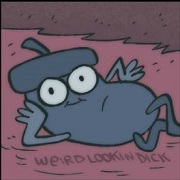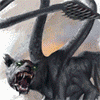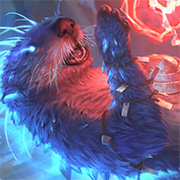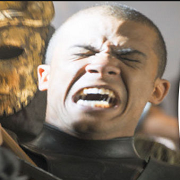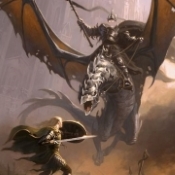Roadie posted:Another really annoying thing with Intelligence as a stat in D&D-likes is when designers keep inserting a bajillion ways to use Intelligence for everything and anything, either because they want to justify their wizards being The Best or because they've gotten the brainbug about how Big Smarts can beat out any need for social aptitude or training or both. Are there similar feats that let me use STR for all skill checks? The Gaston Effect?
|
|
|
|
|

|
| # ? May 26, 2024 02:24 |
|
The sad part is, at least for PF/D&D, you could just arbitrarily replace Int/Wis/Cha with 'Wizard Casting Stat' 'Cleric Casting Stat' 'Sorceror Casting Stat' and nothing of value would be lost.
|
|
|
|
Nessus posted:Are there similar feats that let me use STR for all skill checks? The Gaston Effect? The Flex Mentallo Effect, surely.
|
|
|
|
theironjef posted:Wouldn't a training stat be just as bad but from another angle? Like if you apply training to real life you run into opportunity/privilege driven classism and racism, just, instead of aptitude assertions. Others have answered this well, but I want to add that there is a different discussion to be had about how we present privilege in RPGs that probably needs to be had, yes. I've just taken two cracks at writing a post about it and failed twice. I think I'm probably not properly equipped to do so.
|
|
|
|
Kai Tave posted:The Flex Mentallo Effect, surely. Not emptyquoting. Watch Doom Patrol. I really admire how PbtA implements DTAS in two ways. First off, they strip them down to just the mechanical effect. Stats are just the mechanical effect (a bonus to a die roll), not a number with an associated mechanical effect or effects that are what you ever actually use. The WEG d6 system does something similar; every number on your character sheet is how many dice you roll when you do that thing. Secondly they get away from 'RPG Phrenology' and go with reinforcing the genre you're playing. Apocalypse World itself uses cool, hard, hot, sharp, and weird as their array. Those stats tell you what your character is good at and what the game is about all at once. Even better, they come from an entirely different design philosophy than D&D. Dungeon World recast the classic D&D stats pretty well, but they're still the classic six with all their baggage. On my own part I've used these arrays in full-blown PbtA RPGs or just simple hacks. All stats chosen for their utility in genre emulation, all stats are what the character can do, no objective measurements, nothing for chuds to latch on to. hard, sharp, cool, charm, tech, psi (A Traveller RPG) bang, boom, sharp, charm, tough, slick (elite bodyguards to the 0.01% RPG) claw, think, talk, plan, weird (Advanced Creeks & Crawdads) physique, fighting, persuade, figure, focus, angle (Green Swamp, Blue Sea - a 1960s Florida RPG) fight, figure, front, fast (experimental stats for Green Swamp, Blue Sea) faith, fury, fire. steel, cog, warp (you guessed it, a 40K hack - The Deathwatch Will Protect Your Worlds) fire, fury, faith, with cog/charm/warp (40k again - A Commissar's World Extends as Far as His Voice Reaches) Note that the two 40K hacks use similar, but different, arrays and Commissar's World will have different arrays on different playbooks. mllaneza fucked around with this message at 07:01 on Aug 17, 2019 |
|
|
|
I really like how Lancer does it: Hull, Agility, Systems, Engineering. They represent your mech building ability/philosophy - and you can adjust it every time you level up. It doesn't say anything else about the pilot because it doesn't have to. They are assumed to all be smart enough to know how to put together a custom-engineered war machine. Why do we need smart and stupid characters? Does it add any value to the experience? I don't think it does. Of course D&D's attributes are one of the sacred cows, but I don't see any reason to stick to that paradigm. If we are going to have character classes, attributes are redundant - you are only going to put points into your relevant attributes anyway. Why does a fighter need a stat telling him he is bad at spells if he does not have the mechanical ability to even try casting spells? Why do we need to know that the wizard has low dexterity if he's not going to be doing dexterity things? Particularly as players pick what they want to be doing, e.g. a wizard player probably wants to cast spells and a rogue player probably wants to do roguish things. Attributes are a lot more relevant in classless systems, but then I would absolutely stick with a Lancer or PbtA paradigm.
|
|
|
Kai Tave posted:The Flex Mentallo Effect, surely.
|
|
|
|
|
Nessus posted:Hell I was on an online game using an early version of M&M and the head staffer, who had a character who was basically Forge from the X-Men, house ruled a whole bunch of poo poo that boiled down to "I can use my big dick INT modifier for literally everything." This bothers me because I'm a huge nerd and that's not how Forge's power works. He creates machine solutions instinctively he frequently doesn't understand how they work unless he takes the time to reverse engineer them.
|
|
|
|
Nessus posted:Flex loving owns. I hear he's on TV now? See aforementioned Watch Doom Patrol.
|
|
|
|
Nessus posted:Hell I was on an online game using an early version of M&M and the head staffer, who had a character who was basically Forge from the X-Men, house ruled a whole bunch of poo poo that boiled down to "I can use my big dick INT modifier for literally everything." The only funny joke in there - funny enough that I still remember it despite not having owned the book for almost 2 decades, and funny enough that I am inclined to attribute it to Desborough's co-author because I genuinely don't think Desborough is witty enough to think of it, was the section called The Gun Is My Skill List, which was all about blagging successes in rolls for skills you don't otherwise have through use of a gun in modern-day settings. Intimidation? I have a gun, that's inherently intimidating. Interrogation? A gun to the head should quickly reveal whether there's any realistic scope for this prisoner to spill their guts. Lockpicking? Gun. Sabotage? Gun. (Come to think of it, this might have been a Desborough section because he might have put Seduction in there.) It was funny largely because it accurately reflected the tendency of modern-day games to make guns very powerful - and, for systems where that wasn't objectively the case the tendency of GMs to treat guns like they were a big deal anyway - with the result that players decided that their gun was the shiniest hammer and looked for ways to turn every problem into a nail.
|
|
|
|
Warthur posted:Not quite the same thing but I remember waaay back before James Desborough fell down the rape-is-art rabbithole he and Steve Mortimer wrote a mostly unfunny (and probably offensive these days) book for Mongoose called the Munchkin Guide to Power Gaming.
|
|
|
|
Angrymog posted:They wrote that for Steve Jackson games. What they did for Mongoose was The Slayer's Guide to Female Gamers, which, IIRC, included content that SJG didn't want in the Munchkin's guide. For good reason. I coulda sworn the Munchkin's Guide itself was published by Mongoose at one point, but you're right.
|
|
|
|
Zeppelin Insanity posted:Why do we need smart and stupid characters? Does it add any value to the experience? I don't think it does. The counterpoint that comes most readily to mind for me is that a lot of RPGs try to emulate fiction, and people who are defined by their exceptional intelligence is a common thing in fiction that many people will want to depict or portray their characters as.
|
|
|
|
I mean, do you really lose anything if you just abandon the separation between "attributes" and "abilities"? Plenty of games do this to greater or lesser degree. Are White Wolf games or whatever getting a lot of benefit out of maintaining a division between the guy with Strength 5/Athletics 1, and the guy with Strength 1/Athletics 5?
|
|
|
LatwPIAT posted:The counterpoint that comes most readily to mind for me is that a lot of RPGs try to emulate fiction, and people who are defined by their exceptional intelligence is a common thing in fiction that many people will want to depict or portray their characters as. IMHO, good fiction doesn’t have just generally “smart” characters. It has nerdy characters or studious characters or mathematical savants, people with specific talents rather than a broad intellectual competence.
|
|
|
|
|
Meinberg posted:IMHO, good fiction doesn’t have just generally “smart” characters. It has nerdy characters or studious characters or mathematical savants, people with specific talents rather than a broad intellectual competence.
|
|
|
|
Meinberg posted:IMHO, good fiction doesn’t have just generally “smart” characters. It has nerdy characters or studious characters or mathematical savants, people with specific talents rather than a broad intellectual competence. Miles Vorkosigan being the exception?
|
|
|
|
Roadie posted:Another really annoying thing with Intelligence as a stat in D&D-likes is when designers keep inserting a bajillion ways to use Intelligence for everything and anything, either because they want to justify their wizards being The Best or because they've gotten the brainbug about how Big Smarts can beat out any need for social aptitude or training or both. Shadowrun has a merit you can buy where you can use your Logic instead of your Charisma to represent you using logical, technical sounding arguments when you discuss things, but it has the drawback of that not actually making you any friends because it turns out a lot of people don't really like being spoken to that way, especially underpaid and overworked security guards and shop staff who really don't give a poo poo what logical sounding reasons you provide for them to give you a discount. My rule of thumb is that "replace a stat with a different" skills and abilities are really strong and really boring and I hate them a lot if they don't come with a drawback of some sort to counter being able to use your one big number for everything, especially when everyone knows how MAD sucks and just needing one stat is gross.
|
|
|
|
Meinberg posted:IMHO, good fiction doesn’t have just generally “smart” characters. It has nerdy characters or studious characters or mathematical savants, people with specific talents rather than a broad intellectual competence. Again, another argument for the abolition of ability scores entirely. I'm really good at ball hockey - but I'm not particularly strong nor agile nor dextrous. I've just played a loving lot of ball hockey in my life and eventually even someone like me with no natural talent for it will get good through practice. Skills represent both real life and fiction better than ability scores.
|
|
|
|
I mean, "dude who uses Cha or Int to wield a sword" is one of my favorite d&d archetypes. But I also hate the kind of biotruthy people who try to extrapolate real world analogues from RPG stats. Or vice versa.
|
|
|
|
Meinberg posted:IMHO, good fiction doesn’t have just generally “smart” characters. It has nerdy characters or studious characters or mathematical savants, people with specific talents rather than a broad intellectual competence. Setting aside that gaming isn't especially "good" fiction, all fiction is full of generally smart characters. It's jarring to say that nobody can play the Professor in my Gilligan's Isle campaign because IQ tests are biased, flawed, and served with a side of racism. The actial issue is connecting race, ethnicity, or background to the stat. It's completely ok to say a SMARTS 18 wizard can hold extra spells in his brains, the problem is when a game says that the blonde, pale wizards of the North Islands get a bonus to SMARTS but the swarthy colonized natives get a penalty.
|
|
|
|
But why do you need an INT stat to tell you your character is smart? I'm not trying to be snarky, it's a side I personally don't get because I don't have a lot of D&D background other than Baldurs' Gate and such. Wouldn't playing the character as smart or not be enough? Would you be willing to give up something else mechanically for INT without mechanical benefit, for example by playing a fighter with high INT but lower fighter stats? If you would only play a high INT character if the class benefited from it, then shouldn't the assumption be that that class does it's class things well and the statistic itself is redundant?
|
|
|
|
Darwinism posted:Miles Vorkosigan being the exception? Miles is more defined by Charisma than Intelligence.
|
|
|
|
Piell posted:Miles is more defined by Charisma than Intelligence. I'd argue that it's at least equal, because without his Intelligence he wouldn't pull off the stupid bluffs he makes constantly, but really it's just another case of stats being a terrifically bad way to describe a person
|
|
|
|
Zeppelin Insanity posted:But why do you need an INT stat to tell you your character is smart? That's at the core of how D&D characters interact with their game world. Their attributes are described by their Attributes, and used to define their parameters and engage with in-world challenges. I get that bad people with horrible agendas extrapolate wrong ideas from the concept of intelligence, but their existence isn't enough reason to say no game characters may be described as smart. Zeppelin Insanity posted:If you would only play a high INT character if the class benefited from it, then shouldn't the assumption be that that class does it's class things well and the statistic itself is redundant? An attribute without mechanical benefit doesn't exist in the context of the game. But (whether intentional or not) you're making the case for DTAS, which is really the direction things should be going in.
|
|
|
|
I’m arguing that no one, fictional or otherwise, should be described as “smart” because it’s a fake concept that we should have moved past by this point. This is especially clear when looking at the words that mean the opposite of smart, which are rooted in language around disability in a way that reflects an ableist mindset.
|
|
|
|
|
That's not really a viewpoint which is compatible with reality, fiction, or gaming. I get that it's egalitarian, but you're essentially saying that Mr Spock isn't allowed to be described as "smarter" than Gomer Pyle because you take issue with the word.
|
|
|
|
"Strong" (in the physical sense) is specific: it means you possess muscle strength, tone, and control. It isn't a word that is easily conflated with being anything other than that. On the other hand, "smart" or "intelligent" is far too generic. Do you mean they intake information very quickly? Or they can process and recall rapidly or with great accuracy? Or that their reasoning skills are well-developed? Or that they possess a lot of general knowledge? Or that they've just developed mathematical skills? These exist separately - I know people who can read and recall who don't excel at math and vice versa - and people who can pull endless Jeopardy answers out of their rear end who can't construct a syllogism to save their lives. Zurui fucked around with this message at 20:51 on Aug 17, 2019 |
|
|
moths posted:That's not really a viewpoint which is compatible with reality, fiction, or gaming. I mean, yes? You can describe Spock as rational, logical, better educated, more scientifically literate, but once you attempt to wrap that up into a broad spectrum “smartness” than you start reaching a point where it’s a step away to begin ascribing moral superiority to people who are more “intelligent.”
|
|
|
|
|
Rand Brittain posted:I mean, do you really lose anything if you just abandon the separation between "attributes" and "abilities"? Plenty of games do this to greater or lesser degree. Are White Wolf games or whatever getting a lot of benefit out of maintaining a division between the guy with Strength 5/Athletics 1, and the guy with Strength 1/Athletics 5? I like Storytelling’s Force/Finesse/Resistance split, but there’s no reason it needs to be tied to attributes.
|
|
|
|
Rand Brittain posted:I mean, do you really lose anything if you just abandon the separation between "attributes" and "abilities"? Plenty of games do this to greater or lesser degree. Are White Wolf games or whatever getting a lot of benefit out of maintaining a division between the guy with Strength 5/Athletics 1, and the guy with Strength 1/Athletics 5? I guess the ability to climb a wall with Str+Ath but balance on a beam with Dex+Ath? I think attributes are generally more functional in White Wolf games than in D&D, although even there attribute lists tend to be overpopulated - I’m oft inclined to delete passive/resistance attributes like Stamina and Composure entirely, and also to draw a much sharper divide between Charisma and Manipulation (which tends to just be “evil charisma” by default).
|
|
|
|
Zurui posted:"Strong" (in the physical sense) is specific: it means you possess muscle strength, tone, and control. It isn't a word that is easily conflated with being anything other than that. There's a ton of components to physical strength (instantaneous strength, sustained strength, static strength...) too, but it seems less controversial to treat all of these as "Strength", or at least a combination of the Strength/Endurance/Whatever Your Speed Attribute is.
|
|
|
|
Dawgstar posted:See aforementioned Watch Doom Patrol. They cast Devan Long as Flex. I don't recognize the name, but he's got a pretty extensive resume the last 6 years. https://www.imdb.com/name/nm4231435/
|
|
|
LatwPIAT posted:There's a ton of components to physical strength (instantaneous strength, sustained strength, static strength...) too, but it seems less controversial to treat all of these as "Strength", or at least a combination of the Strength/Endurance/Whatever Your Speed Attribute is. This is in large part because being physically weak isn’t seen as being as much of a sign of inferiority as being of low “intelligence.”
|
|
|
|
|
Describe your character as smart or not, play them as smart or not, that's all fine (if it's fine with your group). There are a lot of personality traits that you can just choose to display, and "generally smart" is easy to convey with display - word choice, how you talk about problem solving, etc. When you have a game stat like "Intelligence", you're making it a stat because you want it to have a mechanical impact. And the mechanical impact in D&D is that it bridges wizard spellcasting with bonuses to a suite of skills that are primarily about being educated. It also gives you more skill points in most versions which, again, we'd associate with more extensive formal training. It's pretty clearly a Lore or Education stat. In theory, bridging unrelated things to create stronger character concepts is what an ability score type thing should be doing. It helps you decide which of disparate elements to focus on for your character, and if done well, gives you interesting choices of sub-specialty and/or helps guide new players through the oft-complicated character creation process. (I don't think D&D ability scores have ever done this very well, even in the otherwise excellent 4e, but that's a tangent.) But if you look at it this way, there are two big problems with the way D&D handles intelligence. First: the name of both the stat and the group of stats. "Intelligence" is an incredibly loaded term, implying things about inherent human potential that are substantively untrue and also have a horrible history. Nerd conservatism is not enough reason to keep using this name for this stat. "Ability" is similarly problematic if you're talking about what should be a Lore stat, because it implies something inherent rather than something based on background and upbringing. Second: the way the mechanics back up that these are your "ability" rather than your background. If Intelligence were a Lore stat, I'd expect it to provide skill points that let you buy skills in a particular group - ones that are part of a broad education. (By contrast, I'd expect "Dexterity" to give points to spend in rogue things, "Strength" in jock things, etc.) Instead, no matter your class or what skills you want, you get more if you've got a high Int. Furthermore, no matter how many skill points you put in an Int-based skill, someone with high Int will be better at it. The Int isn't providing specific training in this skill - it's making you better at it than someone who's equally well-trained. So this isn't just a case of the name indicating something that the mechanics are agnostic about or in contrast with - the name accurately indicates what the mechanics are conveying, that this is about your aptitude for smart-person things independent of training. If you don't interpret reality at all through the lens of the things you engage heavily with, well, good for you I guess. But I hope the number of Hogwarts house quizzes, "the signs as X", and D&D alignment charts on social media would make you understand that people do. And if you've got a regressive, historically harmful attitude towards human intellectual potential at the core to a defining part of character generation, why not make it not that? Ultiville fucked around with this message at 21:30 on Aug 17, 2019 |
|
|
|
LatwPIAT posted:There's a ton of components to physical strength (instantaneous strength, sustained strength, static strength...) too, but it seems less controversial to treat all of these as "Strength", or at least a combination of the Strength/Endurance/Whatever Your Speed Attribute is. Isn't that because there are very few seriously athletic people who aren't at least "pretty good" at all the components of strength, whereas there are plenty of "very intelligent" people who combine a lot of one kind of intelligence with serious deficiencies in another?
|
|
|
|
Zeppelin Insanity posted:But why do you need an INT stat to tell you your character is smart? Yes. D&D 5e and Pathfinder 2e at this point both have ability scores that are mostly irrelevant because you can extremely reliably assume that it will just be something like "+4 in the things your class is good at, +2 in the things your class is okay at, -1 in the things your class is bad at" and then at high level "+8 in the things your class is good at, +4 in the things your class is okay at, +2 in the things your class is bad at". So they might as well just get rid of them entirely and include those bonuses in the numbers the classes get from leveling up, then add some minor quirks/perks you can pick GURPS style to say "big brain energy" or "triple-jointed" for character distinctiveness purposes.
|
|
|
|
Ferrinus posted:I guess the ability to climb a wall with Str+Ath but balance on a beam with Dex+Ath? I think attributes are generally more functional in White Wolf games than in D&D, although even there attribute lists tend to be overpopulated - I’m oft inclined to delete passive/resistance attributes like Stamina and Composure entirely, and also to draw a much sharper divide between Charisma and Manipulation (which tends to just be “evil charisma” by default). Yeah, being able to use different combinations of Attribute+Ability lets you model stuff like multiple people being considered equally Athletic, but in different ways, like a high Strength/low Dex powerlifter compared to the opposite wiry sprinter (dex=speed according to the game) and even a high Stamina marathon runner. I dunno if that's really super important, but it would certainly feel more homogeneous if 5/1 and 1/5 was just 6 on both sheets.
|
|
|
|
EthanSteele posted:Yeah, being able to use different combinations of Attribute+Ability lets you model stuff like multiple people being considered equally Athletic, but in different ways, like a high Strength/low Dex powerlifter compared to the opposite wiry sprinter (dex=speed according to the game) and even a high Stamina marathon runner. I dunno if that's really super important, but it would certainly feel more homogeneous if 5/1 and 1/5 was just 6 on both sheets. I would actually love it if attributes and skills were qualitatively different somehow, like if you rolled attribute + other attribute dice but reduced the target number by your skill rating (to some floor), or if you rolled (attribute) dice and kept (skill) of them, or rolled (attribute) dice and kept the highest and then just added (skill) to the result, or something. I want Str 5 Ath 1 and Str 1 Ath 5 to be distinct even on a roll to lift a weight.
|
|
|
|

|
| # ? May 26, 2024 02:24 |
|
Ferrinus posted:I would actually love it if attributes and skills were qualitatively different somehow, like if you rolled attribute + other attribute dice but reduced the target number by your skill rating (to some floor), or if you rolled (attribute) dice and kept (skill) of them, or rolled (attribute) dice and kept the highest and then just added (skill) to the result, or something. I want Str 5 Ath 1 and Str 1 Ath 5 to be distinct even on a roll to lift a weight. Ooo. There's a game (Tenra Bansho Zero I think?) has you roll attribute dice and you have to roll below your skill on each die so a skill higher than the die you roll means you always succeed and roll maximum successes.
|
|
|















